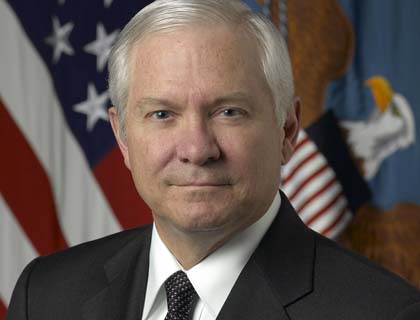BRUSSELS - U.S. Defense Secretary Robert Gates delivered a sharp parting shot at European allies on Friday, saying NATO risks "collective military irrelevance" unless they bear more of the burden and boost military spending. In a final policy address before retiring at the end of the month, Gates said NATO-led operations in Afghanistan and Libya had exposed significant shortcomings in military capabilities and political will among the allies.
With the United States facing painful budget cuts at home as President Barack Obama grapples with a $1.4 trillion (860.1 billion pound) deficit, he warned that U.S. lawmakers may begin to question the 75 percent share that Washington pays in NATO defense spending.
This meant there was "a real possibility for a dim, if not dismal future for the trans-Atlantic alliance," he said.
"The blunt reality is that there will be dwindling (U.S.) appetite and patience ... to expend increasingly precious funds on behalf of nations that are apparently unwilling to devote the necessary resources or make the necessary changes to be a serious and capable partners in their own defense," Gates said.
"If current trends in the decline of European defense capabilities are not halted and reversed, future U.S. political leaders -- those for whom the Cold War was not the formative experience that it was for me -- may not consider the return on America's investment in NATO worth the cost."
Despite having more than 2 million troops in uniform, non-U.S. NATO states struggled to sustain 25,000 to 45,000 troops in Afghanistan, "not just in boots on the ground, but in crucial support assets such as helicopters, transport aircraft, maintenance, intelligence, surveillance and reconnaissance."
"This ... bodes ill for ensuring NATO has the key common alliance capabilities of the future," Gates said. "To avoid the very real possibility of collective military irrelevance, member nations must examine new approaches."
"DRIFT CAN'T CONTINUE"
Gates said the United States was facing a deep economic crisis and defense spending would have to bear part of the burden of dramatic cuts.
"Choices are going to be made more on what's in the best interest of the United States going forward," he said.
"My hope is that the fact that the reality is changing in the United States will get the attention of European leaders to realize that the drift of the last 20 years can't continue, not if they want to have a strong trans-Atlantic partnership."
Gates's remarks followed two days of NATO meetings at which he said too few nations were bearing the bulk of the burden in Libya, and singled out five that he urged to do more.
Officials said he asked Spain, Turkey and Netherlands to fly strike missions in addition to the air operations they currently undertake. He urged Germany and Poland, which are not contributing, to find ways to help, the officials said.
Former NATO Secretary-General Jaap de Hoop Scheffer warned the forum that the current imbalance between the United States and its European allies was "not sustainable."
"Europe has a rather pale face as we speak," he said, criticizing "totally uncoordinated budget cuts" and urging his own nation, the Netherlands, to join strike missions in Libya.
Gates said non-U.S. allies' $300 billion annual defense budget could buy significant capabilities if spent strategically, but ended up funding less than the sum of its parts.
"Too many allies have been unwilling to fundamentally change how they set priorities and allocate resources," he said.
Gates said just five of the 28 allies -- the United States, Britain, France, Greece and Albania -- spend the 2 percent of GDP on defense required by NATO.
While some smaller NATO states managed to punch well above their weight due to the way they use their defense resources, more effective coordination would go only so far and the allies eventually would need to step up their military investments. (Reuters)

